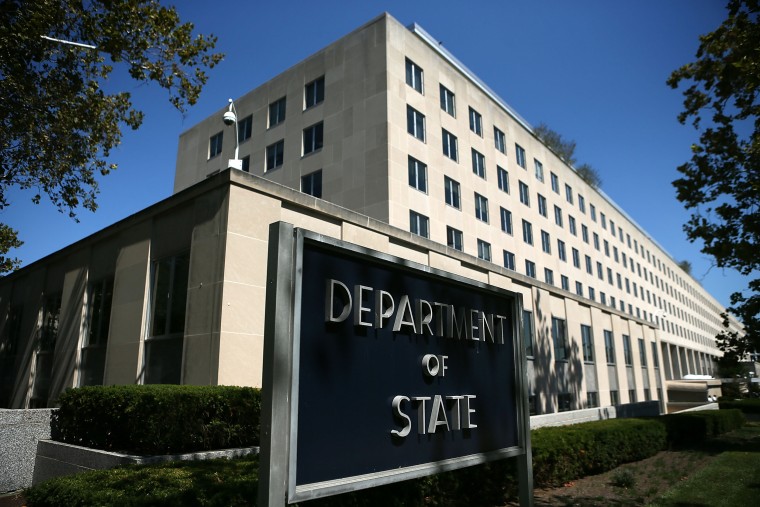Two State Department officials with knowledge of the policy confirm to NBC News that the agency has ordered American embassies and consulates around the world to draw up criteria for "population sets" needing extra scrutiny before receiving visas to travel to the United States.
The orders appear in a recent series of diplomatic cables, according to Reuters and verified by NBC News.
The message also instructed U.S. posts overseas to review the social media accounts of visa applicants who are suspected of terrorist ties or of having been in Islamic State group-controlled areas.
Although it is not clear the extent to which social media accounts of visa applicants were screened in the past, social media could be examined at the discretion of the consular officer.
The guidance was sent in a March 17 cable to all U.S. diplomatic missions to help American officials satisfy President Donald Trump's memorandum for enhanced vetting of visa applicants.
The Associated Press and Reuters obtained copies of the cable, which State Department sources verified for NBC News.
The March 17th cable was issued just two days after a federal judge blocked enforcement of President Donald Trump's revised executive order on entry into the United States.
The State Department wouldn't comment beyond saying it was working to meet the Trump memorandum's requirements and that "visitor screening and vetting procedures are designed to effectively identify individuals who could pose a threat to the United States."
The cable, which was first reported by Reuters, does not define "population sets." But it quickly drew criticism from rights groups and others who've accused Trump of discriminating against Muslims through his now-suspended ban on travelers from six predominantly Muslim countries.
The cable calls for consular chiefs at each post to immediately convene working groups to "develop a list of criteria identifying sets of post applicant populations warranting increased scrutiny" and "attempt to identify individual applicants that fall within the population set during the course of a consular visa interview." Even if the applicant otherwise qualifies for a visa, those identified as meeting the criteria would require additional scrutiny and possible denial.

Amnesty International on Thursday called for the department to publicize the guidance.
"These measures could provide license for discrimination based on national origin and religion," the human rights group said in a letter to Secretary of State Rex Tillerson. "They could provide a pretext for barring individuals based on their nonviolent beliefs and expression. Social media checks, as well as demands for social media passwords at U.S. borders, have significant implications for privacy and freedom of expression."
The instructions tells posts to refer any visa applicant who "may have ties to ISIS or to other terrorist organizations or has ever been present in an ISIS-controlled territory" to a Fraud Prevent Unit for a mandatory social media review. The results of that review are to be flagged and entered into the applicant's file.
Additionally, the cable says consular officers must take into account if an Iraqi visa applicant "was ever present in a territory at the time it was controlled by ISIS." If the applicant was, such information must be flagged for additional review.
The Trump administration originally included Iraq among the countries affected by its proposed travel ban. After a court blocked the effort, a second executive order removed Iraq from the travel ban. That order also has been suspended by a court.
The cable anticipates the new requirements may cause backlogs in visa processing.
"In order to ensure that proper focus is given to each application, posts should generally not schedule more than 120 visa interviews per consular adjudicator/per day. Please that limiting scheduling may cause interview appointment backlogs to rise," according to the cable.
